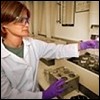|
||||||||||

ABOUT THE PROGRAM
Preventing Disease from Exposure to Toxic Chemicals
 For more than three decades, laboratory scientists at CDC have been determining environmental chemicals to which people have been exposed, the amount of those chemicals that actually gets into their bodies, and the concentrations of chemicals in their bodies that are related to adverse health effects. The highly trained scientists have measured levels of chemicals directly in people's blood or urine. This technique is known as biological monitoring or biomonitoring.
For more than three decades, laboratory scientists at CDC have been determining environmental chemicals to which people have been exposed, the amount of those chemicals that actually gets into their bodies, and the concentrations of chemicals in their bodies that are related to adverse health effects. The highly trained scientists have measured levels of chemicals directly in people's blood or urine. This technique is known as biological monitoring or biomonitoring.
Throughout the world, biomonitoring has become the standard for assessing people's exposure to toxic substances as well as for responding to serious environmental public health problems. Rather than guessing how much of a substance gets into people from measured environmental concentrations, National Center for Environmental Health (NCEH) laboratory scientists have taken out the guesswork by measuring levels of chemicals that actually are in people's bodies. And they do so with precision, speed, and pinpoint accuracy, measuring many chemicals in a very small amount—often a teaspoon or less—of blood or urine.
Predicting levels of toxic chemicals in people on the basis of estimates or measurements of chemicals in air, soil, water, food, or commercial products is difficult and involves making assumptions about people's personal habits and lifestyles; the pharmacokinetics (i.e., absorption, distribution, metabolism, and elimination) of the chemical in people; and the contribution of genetic factors to risk after exposure. In contrast, biomonitoring measures which chemicals—and how much—get into people. Its value lies in decreasing the uncertainty of assessing human exposure and in vastly improving the ability to make timely and appropriate public health decisions.
For More Information...